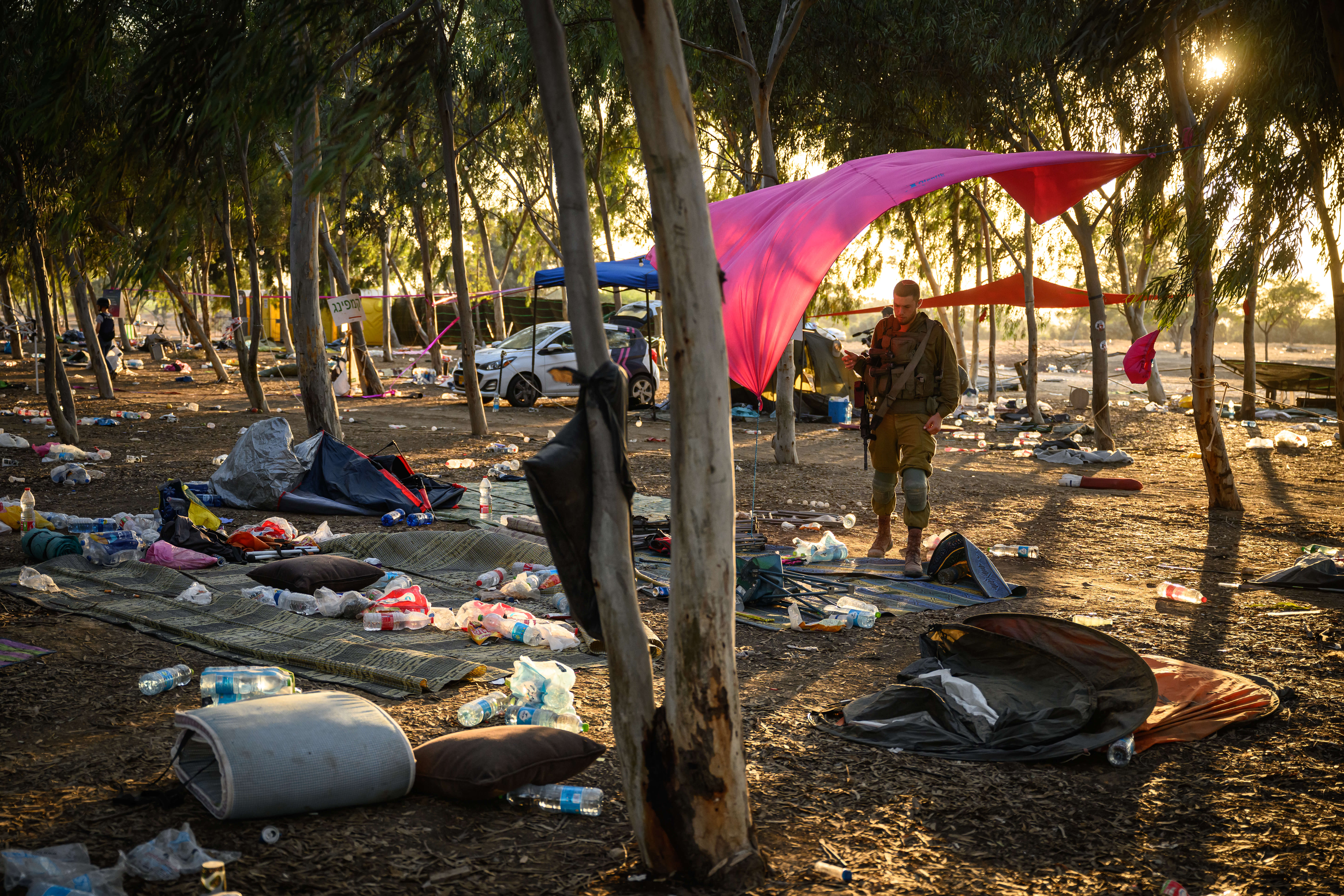One year later, why can’t the UN lay blame for Oct. 7 where it belongs?
The international diplomatic organization has yet to condemn the Hamas terror attack.

The Supernova Music Festival site on Oct. 12, as members of the security forces searched for identification and personal effects of victims of the Hamas attack. Photo by Leon Neal/Getty Images
As world leaders gather in New York for the U.N. General Assembly next week, there should be one item that tops their agenda: Condemn Hamas for the atrocities of Oct. 7 and demand the release of the hostages.
As we approach one year since the mass murder, torture and kidnapping of men, women and children, it is a shame that somehow this is, in fact, not a simple ask.
The U.N.’s refusal to issue this straightforward condemnation puts its credibility at risk. Failing to recognize the brutality of Oct. 7 calls into question the U.N.’s ability to claim to be a gathering place built on human rights and respect for the rule of law.
As I meet with dozens of world leaders in my role as CEO of American Jewish Committee during our Diplomatic Marathon on the sidelines of the General Assembly, I will reiterate our demand for the U.N. to make clear its commitment to human rights and the rule of law by condemning Hamas and calling for the immediate release of the hostages — innocents whose human rights are being violated at this very moment.
As documented by countless hours of footage and first-hand testimony, the events of Oct. 7 were nothing short of horrific. Even with the numerous attempts at revisionist history, any responsible, well-reasoned person — let alone a world leader — cannot deny the pain and suffering inflicted on the Israeli people in the worst attack against Jews since the Holocaust.
Yet, the U.N. General Assembly has failed to pass any resolution condemning Hamas for this attack.
More than 360 people who went to the desert to celebrate peace and music were senselessly massacred at the Nova festival. Families were slaughtered in their homes, and 251 people were taken hostage. If this horror had taken place anywhere else but Israel, the unequivocal condemnation for this mass murder and the establishment of a joint effort for the return of the hostages would have been immediate. That Hamas is recognized as a terror organization by many of the countries whose citizens were abducted makes the lack of this collective effort even more galling.
In March, the U.N.’s own Special Representative of the United Nations Secretary-General on Sexual Violence in Conflict issued a report addressing the heinous and sadistic crimes committed against women during the Oct. 7 terror attacks and against hostages held by Hamas since that day. Yet, we have yet to see official condemnation from the U.N. General Assembly for the crimes documented in this report.
As U.S. Ambassador to the U.N. Linda Thomas-Greenfield said to the U.N. Security Council after the report’s release: “There can be no doubt about what happened on Oct. 7. The evidence before us is damning and devastating. Now, the only question is: How will we respond? Will this Council finally, finally, finally condemn Hamas’ sexual violence? Or will we continue to stay silent?”
Sadly, the U.N. has remained deafeningly silent, even as the U.S. and other member states have spoken out in condemnation of Hamas. Some countries, including Switzerland, even newly designated Hamas as a terrorist organization in the wake of Oct. 7.
Yet, condemning Hamas for the murder of 1,200 and kidnapping of 251 more is apparently too difficult for the U.N. as a whole. The only conclusion must be that the U.N. has a blind spot when it comes to the human rights of Jews and Israelis.
With Hamas still holding captive citizens of 20 other countries in addition to Israel — including Argentina, Austria, Bulgaria, Canada, Colombia, Denmark, France, Germany, Hungary, Nepal, Poland, Portugal, Romania, Russia, Serbia, Tanzania, Thailand, the U.K., Ukraine and the U.S., according to the Hostages and Missing Families Forum — an unequivocal call for the unconditional release of the hostages is the most basic of actions we should be able to expect from a body ostensibly committed to human rights and the rule of law. And yet — silence.
We see this anti-Israel bias not just from the body as a whole but also in individuals, including a U.N. Human Rights Council-appointed “expert” who has sought to somehow justify Hamas’ brutality. Francesca Albanese, the U.N. Special Rapporteur on the Occupied Palestinian Territories, wrote on X the same day of the Hamas attack: “Today’s violence must be put in context. Almost six decades of hostile military rule over an entire civilian population (incomprehensibly ignored by too many official statements and media outlets) are in themselves an aggression, and the recipe for more insecurity for all.”
Beyond this vile attempt to justify Hamas’ terrorism, by refusing to officially condemn Hamas for the massacre of 1,200 and the torture, rape, mutilation, and kidnapping of hundreds more, the U.N. General Assembly has signaled that violence against Jews is justifiable. Their tacit acceptance of this violence has emboldened the carrying of Hamas flags in our streets, the chants of “Long live the Intifada” and the targeting of Jews on subways, in restaurants and at our places of worship.
If the U.N. does not actually think that the horrific acts perpetrated by Hamas on Oct. 7 were justifiable, this is the week to make that clear. The lives of the remaining hostages are at stake. So is the credibility of the U.N.















